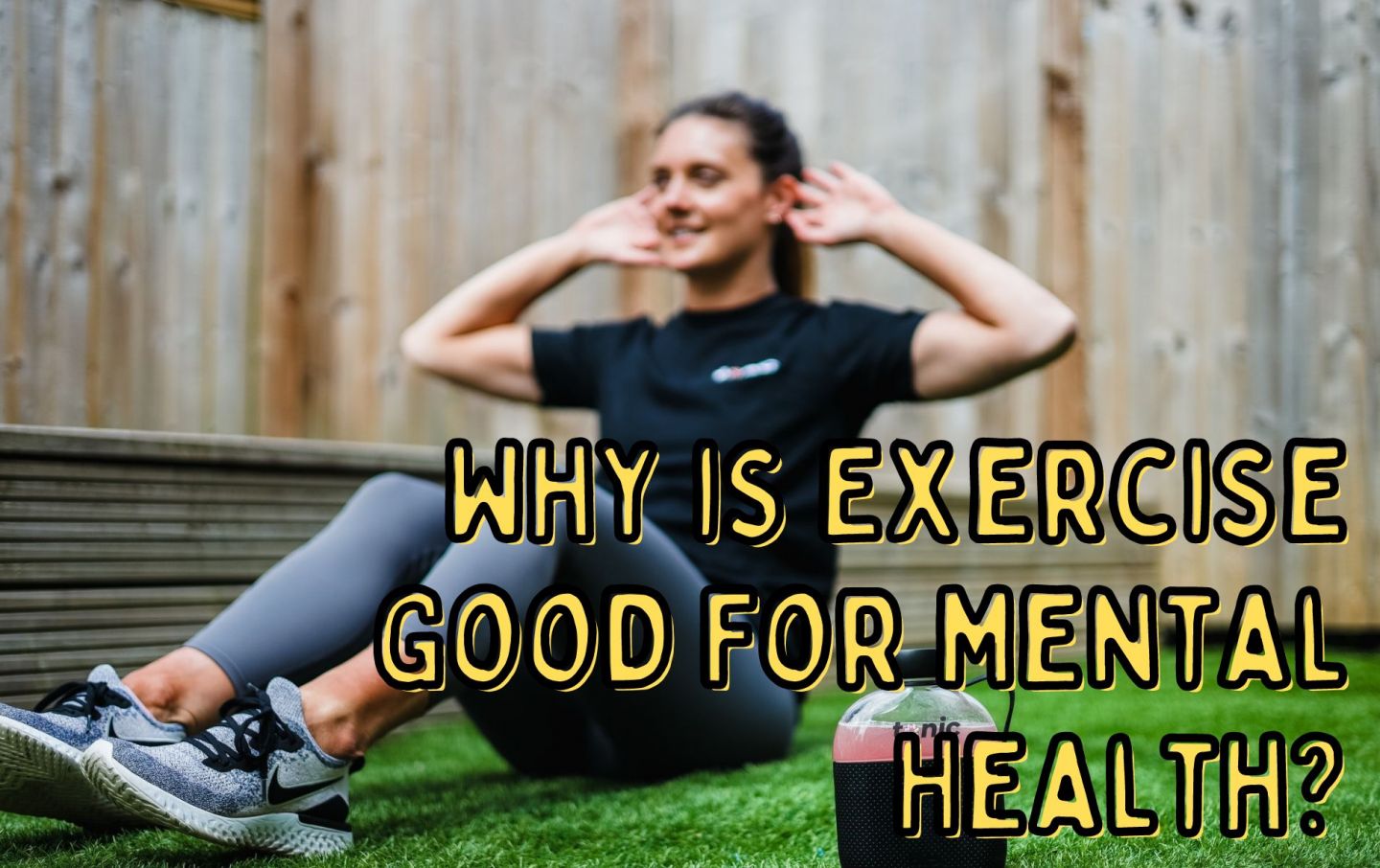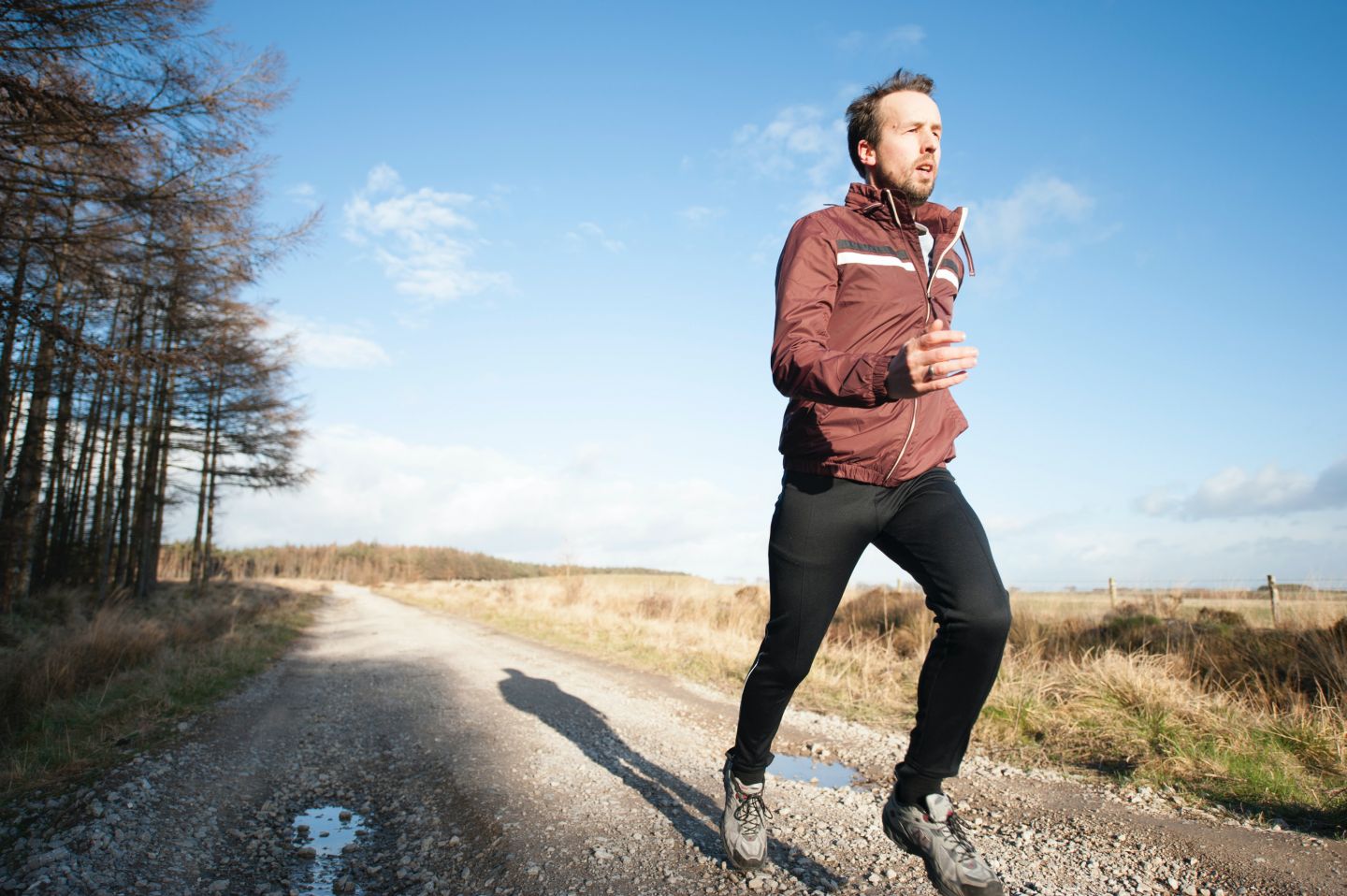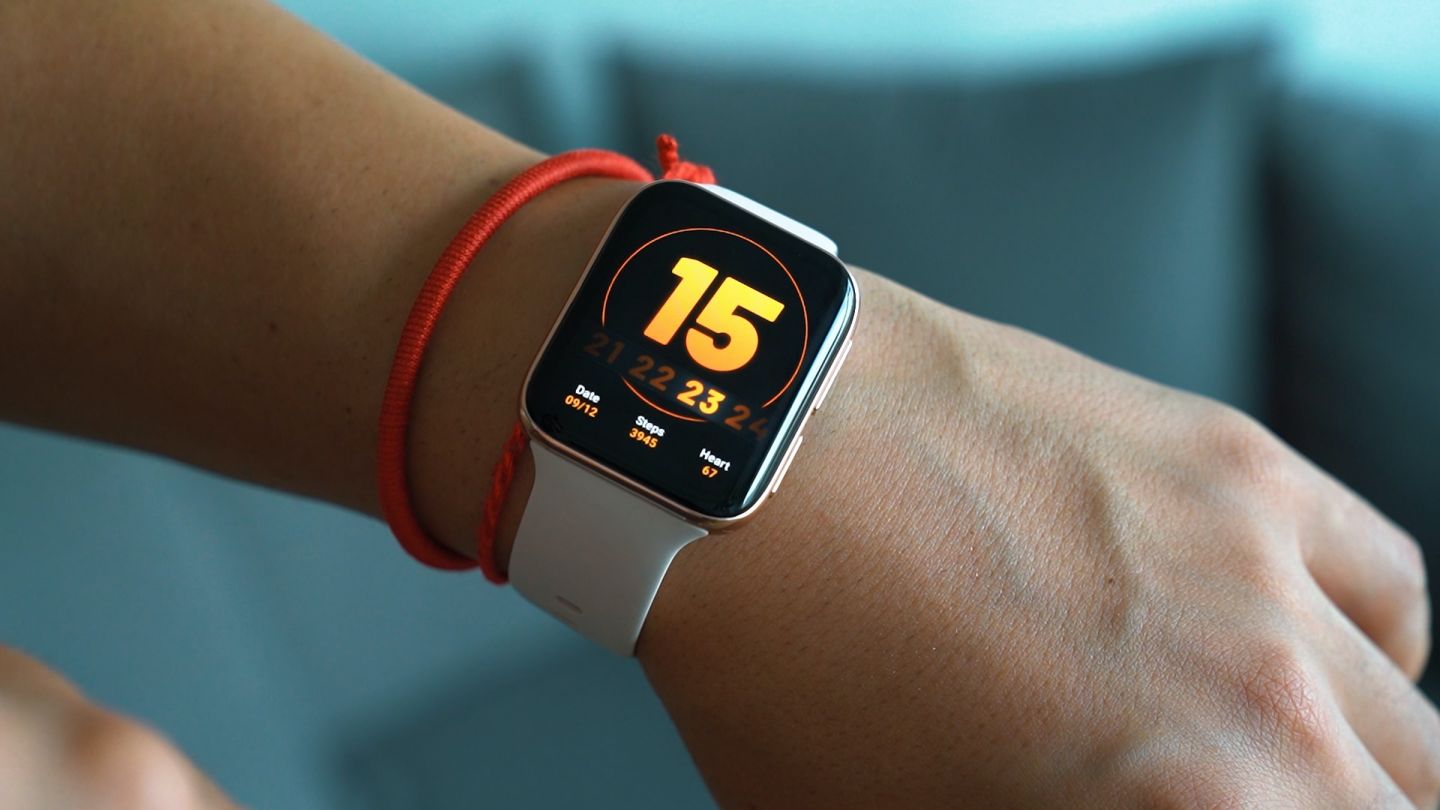Why Is Exercise Good For Mental Health?
30th Jun 2022
Chris Nicklin is a certified Personal Trainer with over 7 years' experience, and the owner of Nxtep Personal Training. Chris qualified from Edge Hill University with a Bachelor of Science (BSc) degree in Sports Coaching and Performance Development, and has delivered over ten thousand one-to-one Personal Training sessions.

Exercise has a host of benefits for your mental wellbeing, including reducing stress, improving mood, and boosting your energy levels. In this blog I’ll go into the reasons behind this, and the best ways to overcome the barriers that you may feel are stopping you from exercising.
What are the mental health benefits of exercise?
Exercise is about much more than looking good. Yes, exercise may enhance your physical health and physique, help you lose weight, add years to your life and could even improve your sex life! However, believe it or not, these reasons are not what inspires the majority of individuals to keep active.
People who exercise regularly and who consider it an essential part of their daily routine, do so because it offers them a tremendous feeling of well-being. They find that they have more energy throughout the day, sleep better, remember things more clearly, and generally feel more optimistic about themselves and their life.
It’s also an effective topical treatment for a variety of common mental health conditions – meaning it can be used as an instant mood booster. But it is exercise on a regular basis that can have a profoundly favourable influence on depression, stress, anxiety, and ADHD. It also reduces stress, reduces blood pressure, enhances memory, promotes sleep, and improves your general mood.
You don’t have to be a fitness enthusiast to gain the advantages. According to research, even little quantities of exercise may make a significant effect, and just from a little you may learn to utilise exercise as a helpful tool to cope with mental health issues, increase your energy, and get more out of life, regardless of your age or fitness level.
Below I’ll go into some of the benefits of exercise for mental health in more detail.

Exercise Improves Your Cognitive Function
There is strong evidence that regular exercise helps protect against cognitive decline and Alzheimer’s disease. Exercise has been shown to improve cognitive function in a number of ways. First, regular exercise has been shown to improve memory and learning skills, presumably because it helps to keep the brain healthy and functional, but also because it has been shown to increase the size of the hippocampus, a part of the brain responsible for memory formation and recall. Second, regular exercise has been linked with reductions in inflammation throughout the body, which is linked with better cognitive health. In addition, research suggests that exercise can help reduce stress levels and increase happiness levels – both of which are also linked with better cognitive function.
Exercise Relieves Stress
When you’re stressed, your muscles usually tense up, particularly in your face, neck, and shoulders, causing back or neck discomfort as well as headaches. Other symptoms are chest tightness, a heavier or faster pulse, muscular cramps, stomach aches, insomnia, heartburn, diarrhoea and even Irritable Bowel Syndrome (IBS). All of these physical symptoms may cause anxiety and pain, which can lead to even more stress, creating a vicious loop between your mind and body.
However, exercising is a good method to stop the pattern. Physical exercise, in addition to producing endorphins in the brain, serves to relax muscles and release stress in the body. Then, because the body and mind are so inextricably connected, when your body feels better, so will your mind.
Exercise promotes the development of new neurons in crucial parts of the brain, such as the hippocampus. Various evidence shows that this may help with the symptoms of some mental illnesses, such as anxiety and depression.
Exercise Boosts Your Energy
Feeling down can leave you feeling tired, which may discourage you from being more active. But try to force yourself to just do some light exercise such as a walk, as even this can be enough to boost your energy, as exercise raises your levels of endorphins and serotonin, both of which are energy-boosting hormones.
Exercise Is a Treatment For Depression
Mental health professionals have long known that exercise is an effective treatment for the symptoms of depression and for numerous reasons. Most significantly, it stimulates all types of brain changes, including neuronal development, decreased inflammation, and new activity patterns that enhance sensations of peace and well-being. It also causes the production of endorphins, which are potent chemicals in your brain that stimulate you and make you feel happy. Finally, exercise may work as a diversion, enabling you to find some quiet time to interrupt the loop of negative thoughts that fuel depression.
On the subject of concentration, you’ll find even more benefit from physical fitness if you really focus on what you’re doing instead of letting your mind wander. Try to really take in the sensation of your feet striking the ground, the rhythm of your breathing, or the feel of the wind on your skin. By including this mindfulness component you will not only improve your physical condition quicker, but you may also be able to break the cycle of anxieties going through your thoughts.
Exercise Can Reduce ADHD
Regular exercise is one of the simplest and most effective strategies to minimise ADHD symptoms and improve focus, motivation, memory, and mood. Physical exercise quickly increases dopamine, norepinephrine, and serotonin levels in the brain, all of which impact concentration and attention. In this regard, exercise actually functions very similarly to ADHD drugs such as Ritalin and Adderall – without the side-effects.
Exercise Can Reduce The Frequency of Panic Attacks
Exercise may be a proactive strategy for those with a panic disorder to relieve pent-up tension, lessen emotions of anxiety and stress and ultimately, reduce panic attacks. Vigorous activity produces endorphins, which calm the body and boost mood, which may reduce the severity and frequency of panic attacks in certain circumstances. Regular exercise may help decrease anxiety over time, perhaps reducing the amount or severity of panic episodes.
Exercise Can Improve PTSD
Evidence shows that concentrating on your body and how it feels while exercising might help your nervous system get “unstuck” and begin to move out of the immobility stress reaction that defines PTSD or trauma. Instead of letting your thoughts wander, pay attention to the actual sensations in your joints and muscles, as well as your insides, when your body moves. Cross-movement exercises (those that work both arms and legs), such as running, swimming, rowing, strength training or dancing, are among your best options.
How much physical exercise should I be doing?

We know all too well that that many people in the UK do not meet the current physical activity guidelines.
A recent YouGov survey found that a quarter of Brits don’t do a single half-hour exercise session a week, and just one in 12 does the recommended 30 minutes of exercise per day. Therefore, it is critical that more people get the information and support they need to make physical exercise a healthy and joyful part of their lives.
The current and widely accepted recommendations are that adults should try to be active every day and accomplish 2.5 hours of moderate intensity exercise each week – the equivalent of 30 minutes five times per week, according to the NHS. It may seem to be a lot, but it isn’t as difficult as it looks, and I have plenty of tips to help you get started.
If you haven’t exercised in a while, start slowly and work your way up to 150 minutes each week. Any aerobic exercise is preferable than none. Even a quick 10-minute stroll will help you clear your thoughts and relax.
Even a little bit of exercise does a world of good
If you don’t have time for 30 minutes of exercise a day, or if your body tells you to stop after 5 or 10 minutes, that’s OK. Begin with 5 or 10 minute sessions and gradually increase your duration – perhaps by 5 minutes each day, or if that is too much, by 5 minutes each week. The key is not to do so much that you put yourself off coming back to it.
You will however that the more you exercise, the more energy you’ll have, so you’ll soon be ready for a little bit more. The goal is to commit to some modest physical exercise on most days, no matter how little. As exercising becomes a habit, you may gradually increase activity levels by adding more minutes or attempting a more intense exercise such as weight or resistance training.
Just stick with it, the advantages of a regular exercise routine will start to become clear!
Overcoming the barriers to exercise
Most people get anxious about trying something new, whether they are feeling good or not, so it can be a bit scary making changes to your life like taking up exercise, particularly if you’re not feeling great from a mental point of view. Some typical impediments to getting started include expense, injury or sickness, a lack of energy, a fear of failure, or even the weather. This is why getting practical and emotional support from friends, family, and specialists is very beneficial. If you struggle to motivate yourself, this is where a personal trainer such as myself can help – we specialise in providing the support and motivating you so you don’t have to!
Below I will cover some of the main barriers to exercise that people experience:
Body Image
Body image issues can make it difficult to engage in physical activities, especially outdoors. People who are concerned about how their bodies may appear to others (which is a huge percentage of us) while exercising may avoid it. The key way to combat this is to exercise in a group with other people who may be feeling the same way. There are many others in your shoes, regardless of weight, age, or fitness level, so try either inviting a friend who may be feeling the same way to join you in your workout, or join a class where you will be just one of many people feeling the same way. For women, attending a female-only fitness class can assist women overcome nervousness as an barrier to beginning to exercise.
Feeling Overwhelmed
When you’re worried or depressed, the prospect of adding another responsibility to your already-busy day might be overwhelming – it can feel like more mental load, so working out can just not seem feasible. If you have children, that can make it even harder – finding daycare while exercising might be difficult if you have children, never mind the costs involved. However, if you start thinking about physical activity as a priority, and something necessary for your mental wellbeing, you’ll quickly discover that even the busiest schedule can accommodate a little physical activity, and once you’ve got started, you’ll feel the positive effects of exercise and will want to continue to keep feeling good.
Exhaustion
When you’re fatigued, unhappy, or upset, it may feel like exercising will just make you feel worse. However, physical exercise is a potent energizer. According to research, even moderate exercise can significantly decrease exhaustion and enhance energy levels. If you’re extremely fatigued, just aim for a 5-minute stroll. You may find that once you’re going, you’ve more energy than you thought and be able to walk for longer, and this can give you a nice boost of accomplishment.
Pain
If you have a disability, a significant weight issue, sporting injury, arthritis, or any other ailment or disease that restricts your movement, consult with your doctor, a physician or your personal trainer about safe exercise options. Pain should not be ignored; instead, do what you can, when you can. If it helps, break up your workout into shorter, more frequent sessions, or try exercising in water to alleviate joint or muscle soreness. At Nxtep, we will always create a bespoke personal training programme which is built around your abilities and limitations – pain being one factor that will determine what kind of exercises we set out for you.
Tips for getting started with exercise
Exercise as part of a group

Make fitness a social event. Exercising alongside a friend, loved one, or even your children can not only make exercise more pleasurable, but it will also help push you to stay to a fitness plan. You’ll also feel better than if you worked out alone. In fact, when you have a mood illness like depression, friendship and company might be just as vital as exercise.
You could participate in a team sport, attend group classes at a gym, or simply arrange a regular meet up with friends who are in the same boat.
If being outside appeals to you, look for courses and sports groups in your local parks – these are usually where Park Runs and boot camp type group exercises take place. You could also track down a walking group near you – try the Ramblers Wellbeing Walks website – which specialises in walking clubs to help those who are suffering from mental health issues.
Alternatively, you may find that a more guided experience such as group personal training where you work out with a small group of likeminded people is what you need to stay motivated enough to commit to regular exercise.
Take it easy at first
When you’re under the cloud of anxiety or depression and haven’t exercised for a long time, setting extravagant goals like completing a marathon or working out for an hour every morning will only leave you more despondent if you fall short. Better to set achievable goals and build up from there.
The best thing is to find an activity with a low barrier to entry that you can practice on a regular basis, or just be more active in your everyday routine by walking or cycling instead of driving or using public transportation.
Do what you enjoy

Concentrate on things that you like. All types of exercise that gets you moving count. This may include tossing a ball for your dog, walking laps around the neighbourhood park, or cycling to the shops. If you’ve never exercised before or aren’t sure what you may like, experiment with a few different activities.
When you have a mood disorder activities like gardening or doing a home improvement project can be fantastic methods to start moving more. Not only will they help you get more active, but they will also leave you with a feeling of purpose and achievement. You may then find it’s not a big leap from this kind of activity to a light exercise such as jogging or swimming.
Remember to reward yourself
Part of the incentive for finishing a session is how much better you’ll feel afterwards, and in the long term. But promising yourself an additional treat for doing it in the first place is an excellent way to improve your drive and motivation to exercise.
However, try to avoid rewarding yourselves with vices such as alcohol or chocolate, as this can lead to an unhealthy cycle. A 2014 study in the USA found a strong correlation between the days people exercise and the days people drink. But alcohol is a bad idea for several reasons; firstly, it is a diuretic, meaning it dehydrates you. Not a great idea after a workout! Secondly, it is a well-known depressant, and therefore can contribute to worsening your mood, which is of course counterproductive if you are exercising to try and improve your mental health.
So, after a workout, treat yourself to something healthy that you enjoy like some gaming time, a hot bubble bath, a smoothie, or an additional episode of your favourite TV programme, for example. If you must have chocolate, just have a square or two of dark chocolate!
Conclusion
Exercise not only has benefits for your physical wellbeing, but it also has major benefits for your mental health. If you’re struggling to just get going, try my tips above to get your foot on the first rung of the ladder of exercise, and if you feel like you could benefit from a professional to motivate you, give me a call and we’ll discuss a personalised training regime that you will enjoy.
